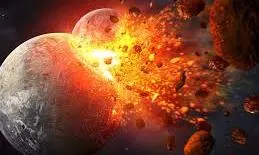
Moon was formed from Earth's mantle, not Theia: new research
text_fieldsA new study has challenged long-standing beliefs about the moon's origin, suggesting it was primarily formed from Earth's mantle rather than the protoplanet Theia.
Researchers from the University of Göttingen and the Max Planck Institute for Solar System Research (MPS) analysed lunar and terrestrial samples, uncovering key clues about the moon's formation and Earth's water history.
Published in the Proceedings of the National Academy of Sciences, the research examined oxygen isotopes from 14 lunar samples and 191 terrestrial measurements using laser fluorination techniques. The isotopic data revealed a striking similarity in oxygen-17 levels between Earth and the moon, contradicting the widely accepted theory that Theia, a protoplanet thought to have collided with Earth billions of years ago, significantly contributed to the moon's composition.
Professor Andreas Pack of the University of Göttingen explained that Theia may have experienced earlier impacts that stripped away its mantle. By the time it collided with Earth, it likely resembled a "metallic cannonball," resulting in the moon forming primarily from Earth's ejected mantle material.
The findings also call into question the Late Veneer Event theory, which posits that Earth's water arrived through meteorite impacts after the moon's formation. Lead author Meike Fischer, formerly of MPS, noted that the isotopic similarity between Earth and the moon eliminates many meteorites as potential water sources. Instead, enstatite chondrites - meteorites with isotopic parallels to Earth and sufficient water content - are now considered the most likely contributors.























